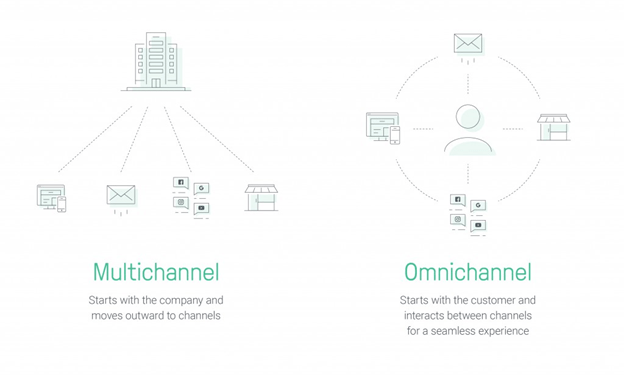Businesses need to use channels, such as email or social media, to communicate and interact with customers. As they find ways to keep this virtual connection with users, they can turn those users into returning customers. This includes utilizing email, social media, and SMS marketing strategies. As you implement an omnichannel marketing strategy, you can draw in more customers.
While some people have heard about omnichannel marketing, they may not know what it is. Luckily, this guide will tell you about omnichannel marketing, how it helps businesses, and initial steps to start using it.
1. What is Omnichannel Marketing?
Contents
Omnichannel marketing means that you put your customers at the center of the business and focus your channels on their needs. By taking this approach, you can make sure that you adjust and adapt your channels according to their needs. As you place customers at the center, you can better integrate those channels into their customer experiences.

Keep in mind that omnichannel marketing and multichannel marketing are different. As shown in the image, omnichannel marketing focuses on the customer to make a seamless experience. Multichannel marketing has the channels do what the company asks them to do. This may seem like a small difference, but it completely changes the way that the channels work together.
Omnichannel marketing allows your channels to remain consistent and unified. As they focus on the customer, they will provide the experience that customers want. By using omnichannel marketing, you can keep your channels consistent and give customers the most convenient experience possible.
2. Does Omnichannel Marketing Work?
Some people may question if omnichannel marketing can benefit companies. To help with this concern, let’s look at some key statistics supporting omnichannel marketing.
- Omnichannel campaigns lead to 18.96% more engagement from people.
- The purchase rate increases by 250%.
- When customers interact with omnichannel campaigns, they make 13% more purchases.
Each of these statistics show how omnichannel marketing brings better profits and benefits to a business.
You want to increase customer engagement when it comes to marketing strategies. This means that customers go out of their way to interact with your business channels. This shows their interest and it gives them more exposure to your business. The more they interact, the more likely they will make a purchase.
Businesses always want more sales. More sales demonstrate your business’ success and it also allows it to continue functioning. When you use omnichannel marketing, your purchase rate more than doubles. To add to this, customers also make more overall purchases when they use omnichannel marketing.
While omnichannel marketing provides multiple benefits, these are some of the key ones. Omnichannel marketing works and your business can improve your marketing metrics by using it effectively.
3. How Search Marketing Plays a Critical Role in Omnichannel Marketing
By using omnichannel marketing, you can improve your search engine marketing (SEM) in these ways.
- Build your channels around search engine optimization (SEO).
- Change your channels based on search engine visitors and customers.
- Optimize your search strategy based on customer behavior.
Think about your customers and the terms, keywords, and phrases that they would search to find your products. You can then adjust your channels to focus on these terms so that you can improve your search engine ranking. This will make your business appear sooner in search engine results through the consistency and use of terms in your channels.
Visitors and customers will find your website through search engines. You can find out what terms they searched to find your website and other channels. From here, you can adjust all of your channels to optimize those terms and keywords so that all of your channels benefit from those searches.
To add to this, you can look at how your customers behave on your channels alongside their interactions. This will let you know what they’re interested in so that you can use that information to make adjustments to your SEO.
Omnichannel marketing works as an effective way to collect data so that you can improve your business’ SEM. As you use both of these tools, they will help you to draw in more customers through search engines.
4. 4 Steps to Implementing Omnichannel Marketing
You may wonder how you can start implementing omnichannel marketing into your business. Follow these four steps to get your marketing strategy started.
- Lay the foundation with your entire team.
- Analyze customer data.
- Employ smart targeting.
- Test and measure.
First, you need to speak directly with your team. Tell them about omnichannel marketing, how it works, and what they need to do and change to implement it. This will allow your team to get on board with the situation, see how it works, and adjust to it. By getting everyone on board, they can prepare and be ready for the switch to omnichannel marketing.
Customer data provides key information to businesses. Review this data so that you can see what your customers want from your omnichannel marketing. This will allow you to adjust your strategy to their needs so that it can draw in more customers.
Smart targeting continues to benefit the marketing world by sending relevant ads to users based on their searches and preferences. You can set up your omnichannel marketing to show relevant ads for your customers.
After you apply your omnichannel marketing strategy, make sure that you spend some time going over it and seeing how it performs. Continue to run tests and to measure your metrics. This will help you to find weaknesses in your omnichannel marketing strategy so that you can improve it.
These initial steps can help you to begin working on your omnichannel marketing strategy. They will help you to get a general idea of what to work on and point you in the right direction.
Conclusion/Takeaways
Omnichannel marketing provides benefits to your business that other strategies can’t match. The statistics show that it works effectively and there are plenty of ways for you to transition into omnichannel marketing. After all, you want your business to succeed and to draw in more customers through your marketing strategies.
Some businesses don’t use omnichannel marketing because they don’t know how to implement it or feel intimidated by it. However, the money you make and the improvements to your marketing will make the work and time worth it.
Make sure to start implementing omnichannel marketing so that you can bring this success to your business.


